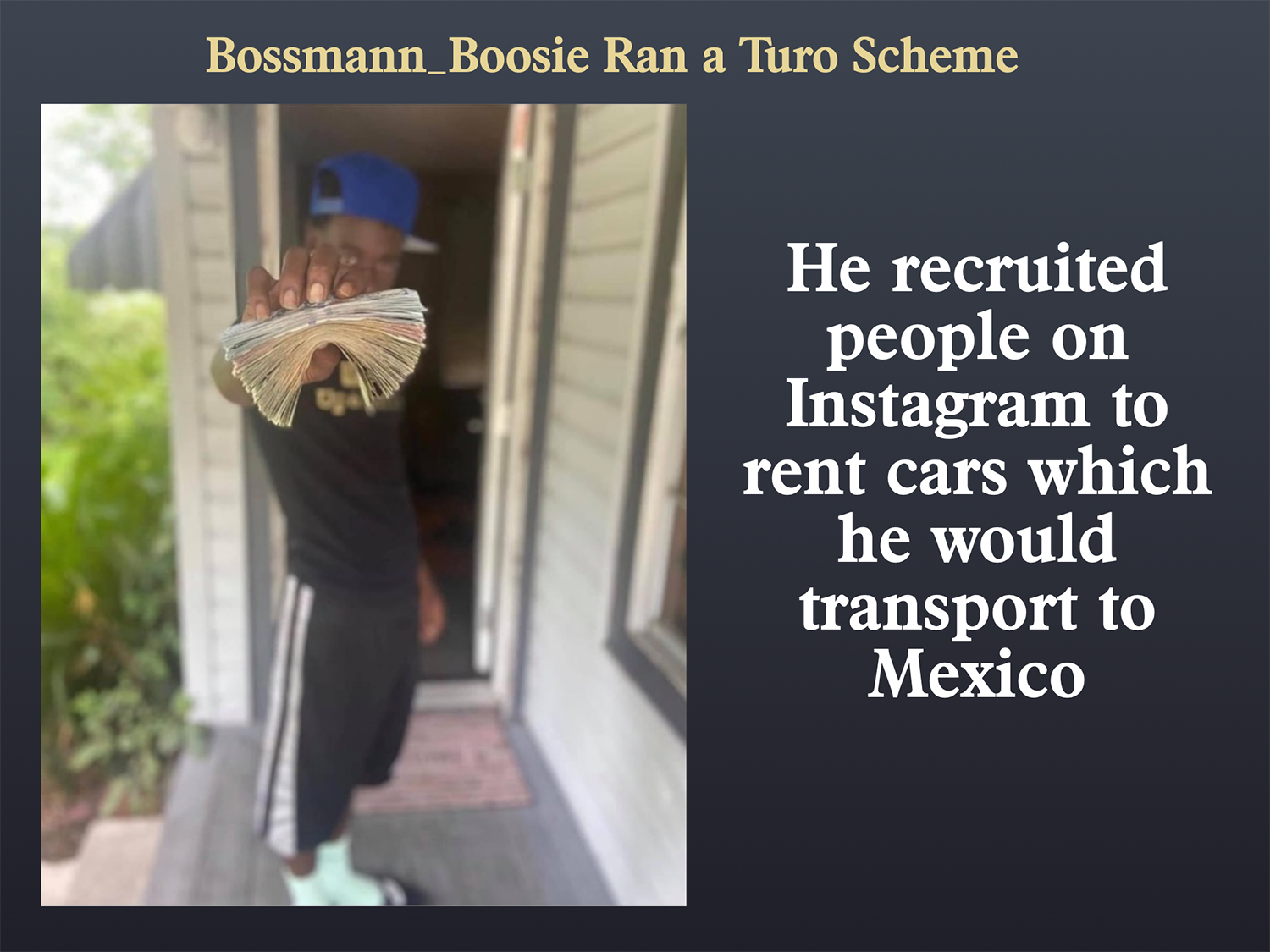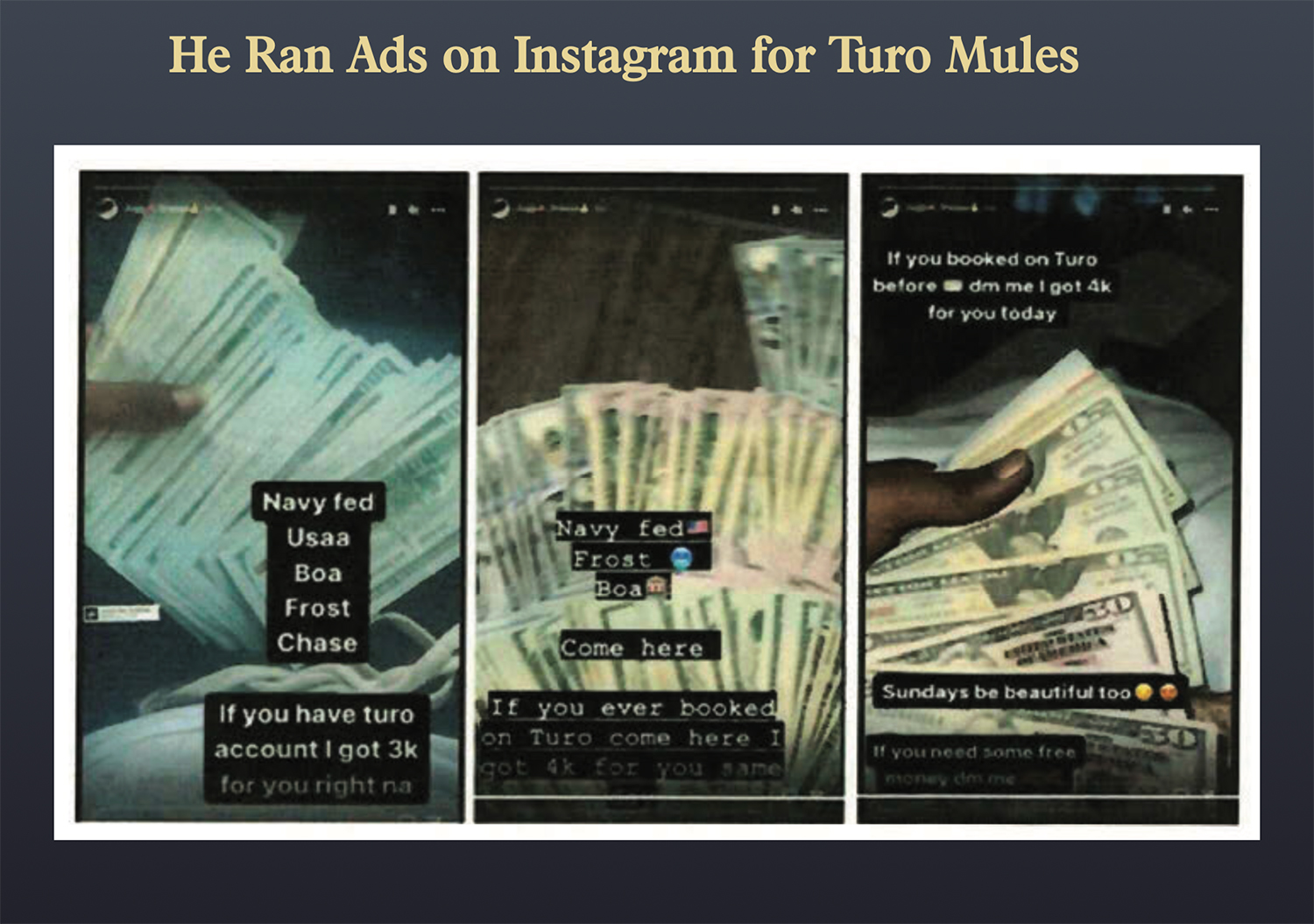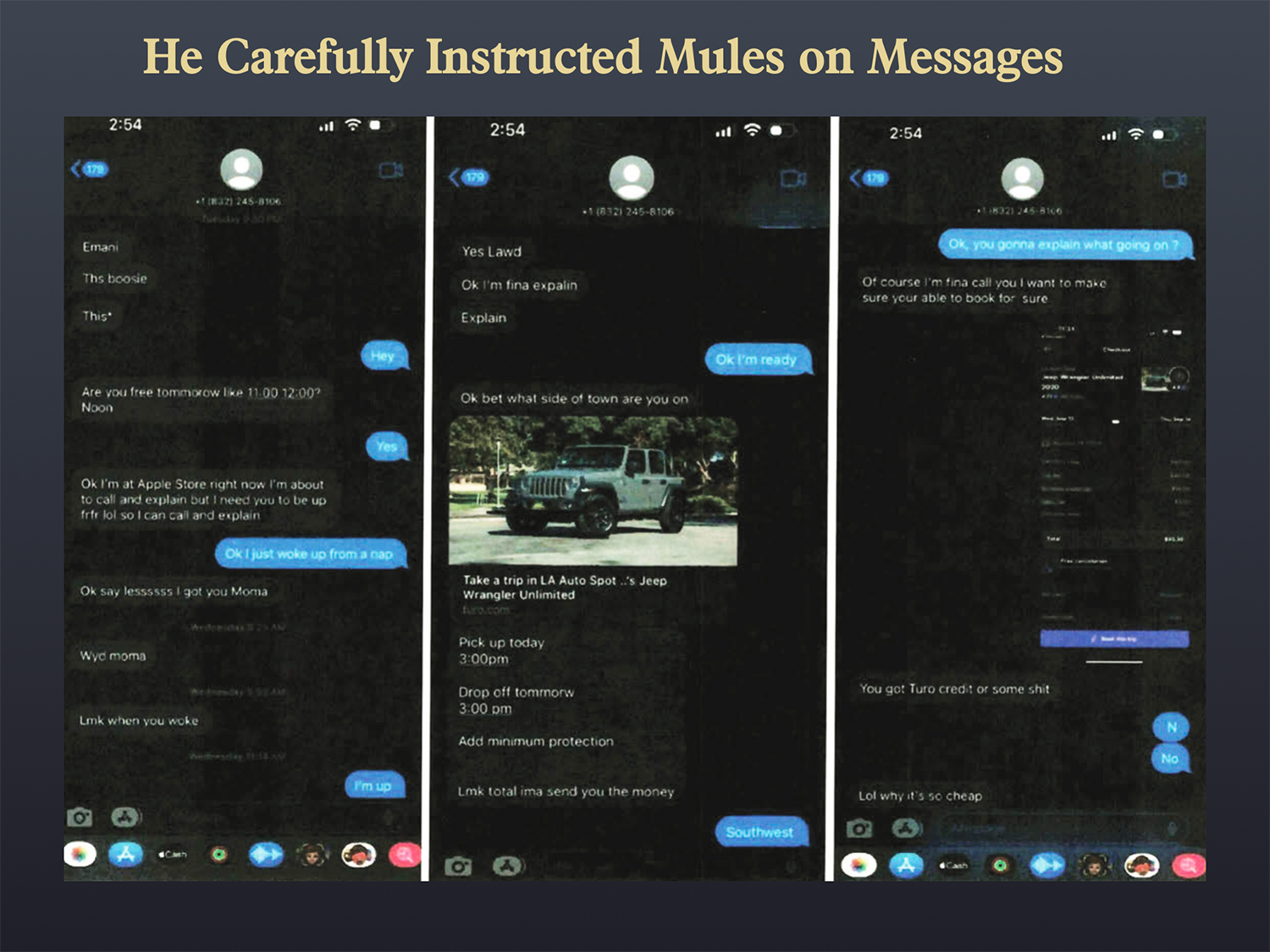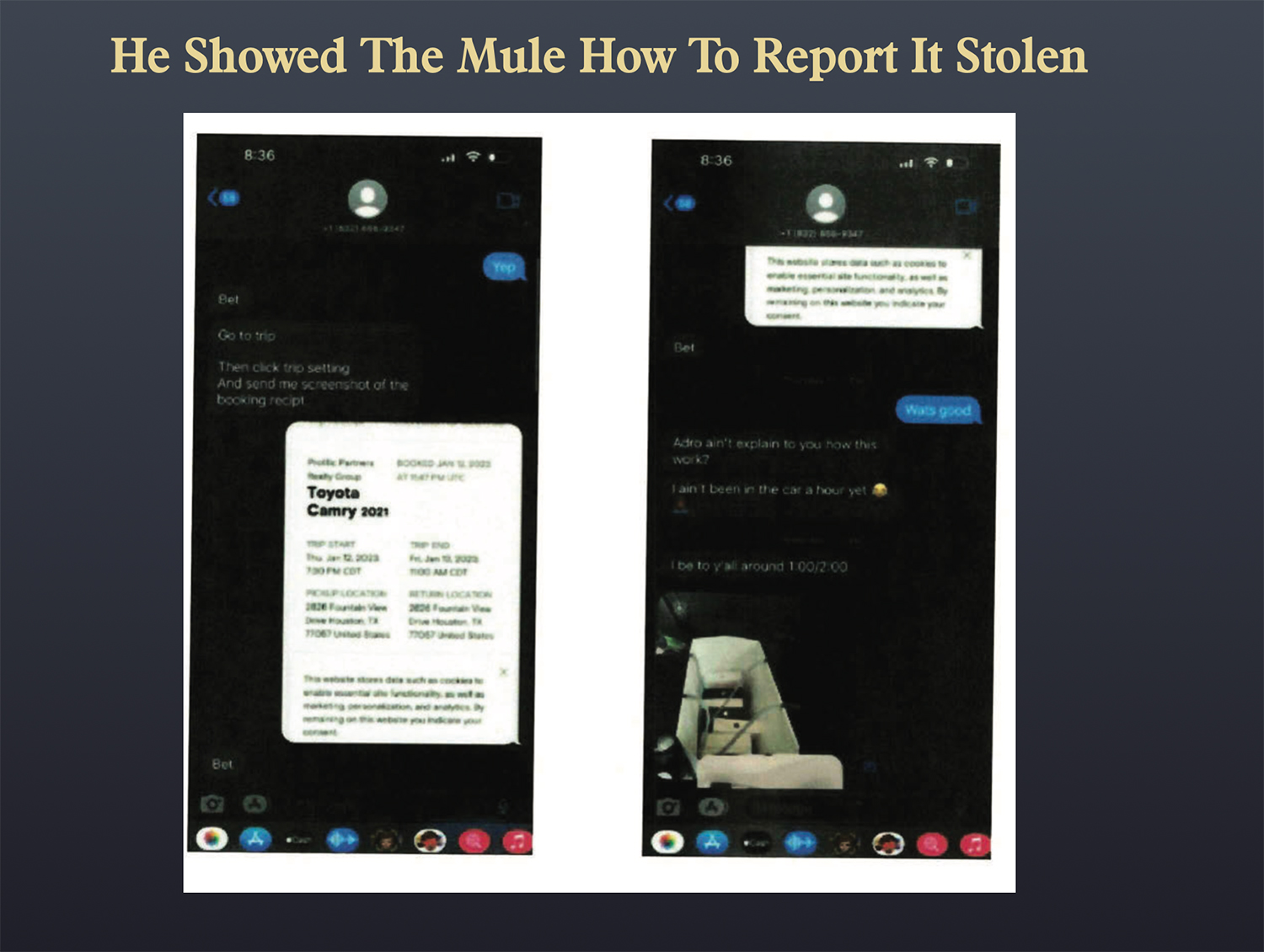Federal authorities have charged a Houston man with orchestrating an elaborate car theft ring that exploited a popular vehicle sharing app and cost the company over $1.5 million in losses.
Kenneth Dwayne Westbrook went by the Instagram handle “bossmann_boosie” He is accused of running a fraud scheme on Turo to deliver Jeeps to the cartel. According to investigators, he was responsible for delivering over $1 million in Jeeps to the crime syndicate.
The charging documents however do not mention who he actually sold the cars too.

A Stolen Dodge Ram Pickup Truck Kicked Off The Investigation
In December 2023, the owner of a Dodge Ram pickup truck rented through Turo reported his car stolen to police.
Police began the investigation into the stolen truck and uncovered a link to Westbrook. One of the renters Westbrook had recruited confessed to Houston police that she had turned the vehicle over to a man she knew as “Boosie.”
He Used Instagram To Lure Renters And Paid Them Handsomely
Westbrook devised the elaborate scheme to take advantage of people that rent their cars on Turo. His operation successfully managed to steal 25 cars using the same method.
He Used Instagram To Find Turo Mules
First, he would post videos and photos on his Instagram account seeking Turo users in the Houston area. Court documents show screenshots from his Instagram Stories where he offers people $2,500 to $5,000 to rent specific vehicles on his behalf – significantly more than the cost of the rentals.

He Would Validate They Were Qualified
When potential renters responded to his Instagram posts, Westbrook would engage with them via direct messages on the platform. He would ask if they had a driver’s license, a bank account, and any previous experience renting through Turo. This suggests he was trying to find renters who would qualify to book vehicles on the app.
He Instructed Them How To Book The Cars
Once he confirmed a renter was suitable, Westbrook would ask for their phone number and move the conversation from Instagram to iMessage or SMS texts. The complaint features several screenshots of these text conversations, showing Westbrook providing renters with specific Turo listings and instructing them on how to book the vehicles.
He Arranged The Drop-Off
After a renter booked a vehicle, Westbrook would provide details on where to pick it up and where to leave it for him, usually with the keys inside. Renters interviewed said he connected with them on Instagram, offered $2,500-$5,000 for renting a car, sent a portion of money upfront, and then gave drop-off instructions once it was booked.

Once He Got The Keys, He Took The Cars To Mexico
Once Westbrook got the cars, he delivered them to Mexico – presumably for the cartel to use in their crimes.
According to witness statements however some Turo Mules got cold feet. The mules that rented the cars for him, desperately tried to get Westbrook to return the vehicles for them. But he stalled them out coming up with excuse after excuse so he could buy more time with his scheme.
@thechristopherpearce Man was arrested for selling cars to the Mexican Cartel #carnews #jeep #texas #cartel
♬ original sound – Chris Pearce
In a text conversation with a renter who was trying to get a vehicle returned, Westbrook apparently said “I don’t have the car, the car is in Mexico.”
He Instructed Turo Mules To Report The Car Stolen To Buy More Time
When one renter got antsy, Westbrook reportedly told the renter how to report the car stolen so that he didn’t have to return the car.
Screen shots from the conversation show just how explicitly he told the renter how to report the car as stolen using the app.

GPS Tracked Cars Into Mexico
Luckily, some of the cars were equipped with GPS Tracking devices which made recovery easier. Court documents indicate that GPS data showed some of these cars crossing the border from Eagle Pass, Texas into Mexico, or being driven near the border. In one case a Jeep Wrangler rented by a witness was tracked leaving Eagle Pass and entering Mexico on September 14, 2023.
Turo and law enforcement were able to recover at least five of the stolen vehicles in Mexico.
“The defendant exploited a new technology platform to commit old-fashioned theft and fraud on a massive scale,” said U.S. Attorney Jack Smith. “Thanks to the diligent work of our law enforcement partners, this brazen scheme has been brought to a halt.”
Turo Says Victims Reimbursed And That They Are Working With Law Enforcement
For their part, Catherine Mejia, a Turo spokeswoman, says that they worked quickly with Law Enforcement to identify who was responsible for the scheme and worked to make sure victims did not incur losses.
“We worked to identify the individuals involved and brought this matter to law enforcement. We are gratified that the amazing men and women of the FBI and DOJ worked swiftly and professionally to further investigate the matter and arrest the culprit. We’d like to remind our car-sharing community impacted in this case that in addition to reimbursing them for any vehicle losses, we’re continuing to proactively work with law enforcement to bring Mr. Westbrook and his associates to justice.”
Turo Schemes and Scams Are Growing
Turo fraud schemes are on the rise and many of these schemes are developing on social media including Telegram, Facebook and Instagram.
The platforms growing population and ease of use have made it an attractive target for scammers that look to exploit the “trust based” system that enables owners to rent their cars to people they don’t even know. High end vehicles can be rented on the app which also make it a target for sophisticated subleasing and synthetic identity schemes.
The Wall Street even covered some of the risk of Turo in this article titled – Rental Cars Are The Airbnb. The article exposes a litany of risk that owners have reported while renting their cars including car theft, their cars being involved in shootings, cars taken across country and left abandoned and a host of other issues.
Turo is risky business so be careful out there!



